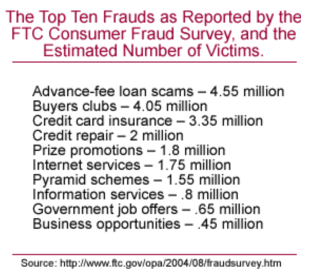How to protect yourself from becoming a victim of credit fraud
by
Rebecca Lindsey |
|
| Rebecca Lindsey is a staff writer for Credit Ratings.com.
CardRatings.com
offers a consumer report of US credit cards and instant online approvals. Named
among the 'Web's Best Sites' by SmartComputing magazine! The site is courtesy of
Citizens for Fair Credit Card Terms, Inc. |

Do you often feel as though you must be on the
lookout at every turn, because there are people out there just waiting to rip
you off?
I hate to be the bearer of bad news,
but...that might not be a bad idea.
Recently, the Federal Trade Commission released
the results of a Consumer Fraud Survey. Astoundingly, it estimated that nearly
25 million Americans were victims of fraud in 2002.

The study indicated individuals with high levels
of debt are more likely to be victims of fraud. Three of the top categories of
fraud reported to the FTC related to credit, including credit-repair scams aimed
at those carrying high debt loads or having bad credit. The most frequently
reported type of consumer fraud: advance-fee loan scams, in which consumers pay
a fee for a “guaranteed” loan or credit card.
One example of a “pay first guarantee” is what’s
called a catalog card. Aimed at those with no credit or poor credit, catalog
cards are advertised as a sure-fire way to get a credit card that can be used to
purchase all types of merchandise. What many consumers don’t know is that
they’re paying an inflated fee for a card that they can only use in specific
catalogs. They cannot be used at stores, online, or anywhere else. While the
catalogs do have ‘all types of merchandise,’ the merchandise is greatly
overpriced.

Credit-repair scams can vary, but most charge
their customers a fee to ‘erase’ bad credit when in fact the credit bureau or
the creditor are the only ones who can remove negative entries from your credit
report. Other so-called repair schemes encourage consumers to apply for an IRS
Employee Identification Number, and to use this number (which has the same
number of digits as a Social Security Number) to apply for credit and loans. The
companies promising such things are dishonest and illegal.
In another ruse, consumers are encouraged to buy
protection in case their credit card(s) are stolen and used to run up a big
bill. Federal law already protects credit card users with consumer liability
capped at $50. In addition, many credit card issuers offer free “zero liability
protection policies” that offer full liability protection (i.e. you liability
for fraud is $0).
“If it sounds too good to be true…”
It probably is. According to Gerri Detweiler,
founder of
DebtConsolidationRX.com and author of “The Ultimate Credit Guide,” those
with debt problems are often easy prey because they’re looking for a quick fix.
She says, “People avoid dealing with debt problems because they face unpleasant
decisions, and they’re searching for a perfect solution. The problem is there
usually isn’t one perfect solution for debt troubles.”
By the time some get around to dealing with debt
problems, they can be overwhelming. Detweiler continues, “Many people are so
desperate for a solution at that point, they try things that don’t sound or look
right to them.”
“In order to steer clear of scams, you have to go
with your gut,” continues Detweiler. “You have to make some tough decisions that
may have an impact on your credit card, such as whether to undergo credit
counseling, bankruptcy, or debt consolidation. There is no quick and easy
solution, only time and effort on your part will bring debt under control.”
“There are no new scams…”
Yes, they’re the same old scams out there.
Unfortunately, it’s a whole new bunch of technology that’s being used to the
scammers’ advantage, making fraud more sophisticated and harder to detect than
ever before. Scammers do everything they can to imitate real offers or
situations, and it is truly difficult to distinguish between what is real and
what is false.
Phishing is one of the latest methods of identify
theft. Emails are sent to unsuspecting consumers from individuals or groups
claiming to be major credit card companies, banks, retail companies, etc. The
emails seem legitimate enough: “...they’re updating their system and need to
verify your account number, password, social security number, or credit card
number. It will just take a moment of your time.”
Ira Stoller, Senior Member on the
CardRatings.com Message Board, was recently hit with a phish in the form of
a fake email doing a pretty good impression of an Ebay consumer alert.
“The message relayed that EBay was updating their
database and needed to verify my credit card information,” says Stoller. While
the email looked credible, Stoller knew that EBay doesn’t utilize or house
credit card information—Ebayers who use credit cards to pay or receive payment
utilize a third party. Someone was “phishing” for his credit card information.
The email conveniently included a link to a form in which he could fill in the
“needed” information.
Stoller next did something that not enough
consumers do. He checked the EBay website for a consumer complaint page and
reported the fake email. Companies emulated by these types of scams want to know
about fraudulent activity that illegally uses their name and trademark because
it will help them to protect the consumers who use their services.
Other ways to report fraud:
- Consumers can call a special FTC hotline –
1-877-987-3728 – to report a scam or get more information about
telemarketing fraud and how to prevent it.
- The following link can be used by consumers
to file complaints against card issuers:
http://www.occ.treas.gov/customer.htm
- If you think you've been a victim of an
advance-fee loan scam, contact your local consumer protection agency, state
Attorney General or local Better Business Bureau (BBB) to report the
company.
Finally, how do you keep up with what’s real and
what’s not without being completely paranoid? There are lots of resources to
help you distinguish fraudulent activities from the real thing. Consolidated
Credit Counseling Service, Inc. offers “Watch Out For Credit Scams,” which
covers many types of fraudulent activities in detail. It is also a good idea to
review our free
credit card
ratings, including our popular credit card
consumer
reviews, before you apply for any credit card offer.
Finally, the FTC shares the following tips:
- Legitimate lenders never "guarantee" or say
that you are likely to get a loan or a credit card before you apply,
especially if you have bad credit, no credit, or a bankruptcy.
- If you apply for a real estate loan, it is
accepted and common practice for lenders to request payment for a credit
report or appraisal. However, legitimate lenders never ask you to pay for
processing your application.
- Never give your credit card account number,
bank account information, or Social Security Number over the telephone or
Internet unless you are familiar with the company and know why the
information is necessary.
- If you don't have the offer in hand or
confirmed in writing and you are asked to pay, don't do it. It's fraud and
it's against the law.
--End--
| 